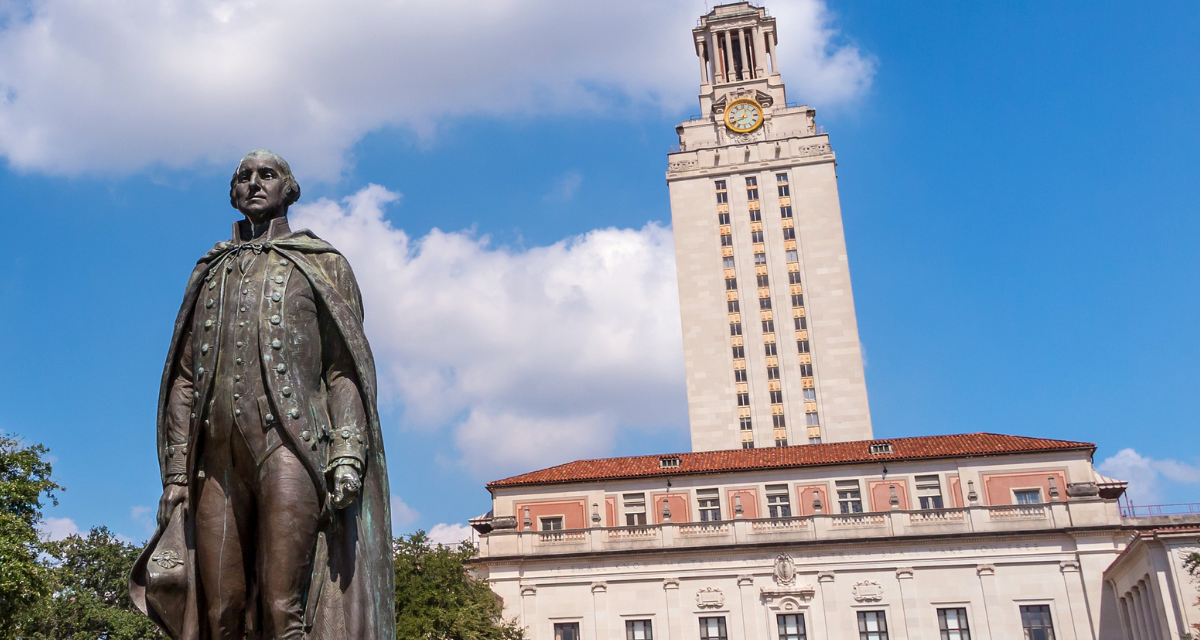
Though the University of Texas at Austin currently boasts the #1 ranked Division I college football team in the nation, a team many experts pick to win this season’s National Championship, the school is losing when it comes to cultural diversity.
At least, that’s the assessment of many UT alumni, current students, and faculty regarding the school’s responses to S.B. 17, which bans diversity, equity, and inclusion (DEI) programs at public colleges and universities throughout Texas.
IMPACT OF SB 17
“The heroic and game-changing work done by Black students at UT in the 80s and early 90s, it’s sad to say, but in a matter of one year, SB 17 has destroyed that work,” said UT alumna Kimberley Yancy.
According to Yancy, the building that housed many initiatives serving UT’s Black students still stands, “but there’s no programming there as a result of SB 17.”
Along with the nearly 60 faculty and staff who were fired in the Spring due to the end of DEI-funded programs and positions, UT campus organizations were required to remove any mention of race in their names. Funding to support Black, Latino, immigrant, and other historically underserved and underrepresented groups is now gone, leaving organizations scrambling for resources to provide the programming and support they have offered for decades.
One example: Black students nearly missed out on vitally important experiences like the annual Big 12 Black Student Leadership Conference. Thankfully, Black alumni stepped in and funded conference-goers, and helped them get to the University of Oklahoma, where Black OU students allowed UT students to sneak on their bus to get to the conference in February at Iowa State University.
“Remember Plessey vs Ferguson, the law that basically said we’re separate but equal, but absolutely nothing was equal? That’s basically what [UT] is trying to say all over again, just in a different way,” said Yancy, who currently serves on the LaMarque City Council.
Yancy points out that 54% of Texas’s population is Black or Hispanic, making Texas a “majority-minority” state. However, of the state’s wealth, Latinos collectively possess only 5.6%, and Blacks have even less, at 1.8%.
“The data does not back up not providing resources, not providing funding, not providing opportunities for people where opportunities were for so many decades by law denied. So, SB 17 is meant to take us backward and fast,” added Yancy.
And current students feel it.
“It’s beyond Black and Brown students. It’s also students who have disabilities who are sad. There are students who represent different genders and sexualities who are sad,” graduate student Zion James told NBC News. “Overall, the campus morale is sad. We don’t know what to do. We don’t know where to go, or how to move forward.”
STUDENT PUSHBACK
Though James was unsure how to proceed, thousands of UT students have been very decisive in choosing various forms of activism to protest SB 17 and UT’s decisions to interpret that legislation in the most draconian ways.
In May, a large contingent of UT students joined students from campuses across the state to attend the Texas Senate Subcommittee on Higher Education’s hearing to discuss new policies on antisemitism, free speech, and compliance with the state’s ban on DEI programs.
However, according to MOVE Texas, an organization dedicated to building the political power of young Texans, students were excluded from the first panels, and forced to wait for over six hours while testimony was restricted to “select, one-sided panelists, excluding the broader community, and crucially, the students” who… had been waiting to ensure their voices were heard.
Currently, the UT student body is between 4% and 5% Black. The school has never enrolled more than 6% Blacks in any incoming freshman class in its 141-year history.
The 1970s and 80s saw UT increase its scholarship investment in Black students. Once enrolled, Black students fought to make the campus more accepting, forming organizations like the Black Student Alliance, African American Cultural Committee and Steve Biko Committee, and founding campus chapters of the National Student Business League, National Society of Black Engineers and nearly all Divine Nine organizations.
Initiatives like a weekly “Soul Night” at the Student Center and a nationally celebrated Black student newspaper, “The Griot,” were led by Black students. An annual Heman Sweatt Leadership Award was founded to honor Sweatt, the Houston-area postal worker who sought admission to UT’s law school, and UT’s Black students who exhibited exceptional leadership. Sweatt’s barred UT admission gave birth to Texas Southern University.
Black student organizations hosted conferences, fashion shows, and an array of national speakers, including Angela Davis, Stokely Carmichael, Jesse Jackson, and countless others.
According to Yancy, the campus culture has changed dramatically.
“UT is not the same place that it was not even five years ago. It’s not the same place.”
The same is true for students who have only been enrolled over the past two to four years.
“The university we were proud to be admitted to kind of turned their back on us and took away our support services, our staff that helped us feel more welcome at this university,” said Victoria Uriostegui, a student activist who provides support for immigrant students at UT.
ADDITIONAL PUSHBACK
More than 600 UT faculty members have signed a letter that began circulating on April 25 expressing displeasure with university president Jay Hartzell, claiming UT’s removal of staff after the state passed SB 17 happened despite Hartzell earlier indicating that the university’s Division of Campus and Community Engagement (DCCE) complied with SB 17.
The situation is so dire the Texas NAACP is planning on suing UT regarding the organizations the school is not allowing to access campus space for meetings and to which UT is denying operating funds.
“We’re suing so that the school can lose their federal funding because their actions regarding SB 17 are a direct violation of federal law,” said Yancy, an NAACP Texas member.
ACTIONS MOVING FORWARD
For Yancy, there are very specific actions Blacks must take regarding this issue.
“We have to ask a question as a community of color, why are we sending our kids to schools that don’t celebrate who we are now? We need to reevaluate where we send our talent and where we’re sending our athletes. You’re not sending them to a place that’s welcoming anymore.”
Moreover, Yancy says Blacks must demand that our taxpayer money is being given out correctly.
“UT gets more taxpayer money than any other public school in the state of Texas. Basically, we’re financing our own oppression. Think about that. We are sending money to the University of Texas as taxpayers, and they are telling our students, ‘We don’t care about you.’”
She asserts SB 17 must absolutely be repealed in this next 2025 state legislature.
“We need everyone to call their state representatives and tell them that SB 17 is detrimental to the health and emotional health of students at the University of Texas.”




